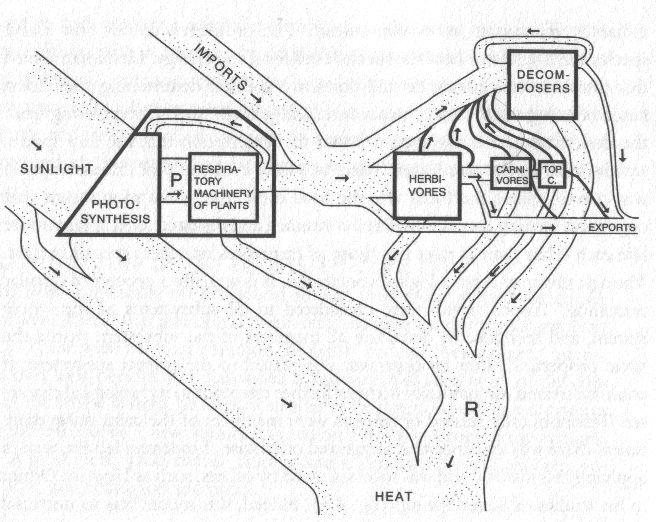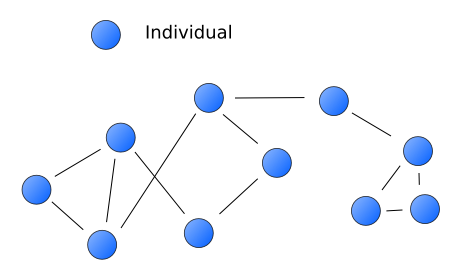In A Local Economy’s Network
We continually review and often revise—to better describe—INCOMMN’s vision and mission.  Let’s start with the name: INCOMMN is an acronym for “Interactive Communities Network”. “Communities” include the communities we live in, we work in, and interact in. Our name is itself visionary: imagine a highly active fabric of interconnected businesses and communities that describe a regional economy as a whole. To accomplish this, we’re committed to building, encouraging, and supporting ecosystems of businesses, non-profit organizations, and local communities. An ecosystem is the detailed interactions and resources in which we all operate. For INCOMMN, this ecosystem provides the environment, resources, transactions, and supports for on-going venture, organizational, and community development. What emerges from all this is the collaborative economy: all the players, ideally on and with purpose, but often enough by accident, interact in ways to help each other achieve and accomplish. This is the “common good” in action.
Let’s start with the name: INCOMMN is an acronym for “Interactive Communities Network”. “Communities” include the communities we live in, we work in, and interact in. Our name is itself visionary: imagine a highly active fabric of interconnected businesses and communities that describe a regional economy as a whole. To accomplish this, we’re committed to building, encouraging, and supporting ecosystems of businesses, non-profit organizations, and local communities. An ecosystem is the detailed interactions and resources in which we all operate. For INCOMMN, this ecosystem provides the environment, resources, transactions, and supports for on-going venture, organizational, and community development. What emerges from all this is the collaborative economy: all the players, ideally on and with purpose, but often enough by accident, interact in ways to help each other achieve and accomplish. This is the “common good” in action.
A Regional Economic Model
 At the more mundane level—putting this into practice—I often get to work on projects that fully illuminate the network. In the past month, I’ve been developing an economic model—a picture—of the Western Massachusetts region and sub-regions to reveal the particulars of this networked economy. It’s truly fascinating to develop the image at this highly detailed level. I’ve been doing this sort of data gathering and analysis for almost thirty years now; studying regions throughout New England, Colorado, Illinois, California, and Europe. Regional economic modeling and analysis has its rewards: great, beautiful pictures are revealed. This week, I was reminded of this again. We discover in these projects just how tightly woven the economic fabric in any region can be, and what might be achieved if we work even more on developing that fabric. And it is a fabric: a network so well connected and established that we see very clear patterns. For example, even small scale increases in production in any one major industry create jobs and raise incomes throughout the entire network. The inverse is also true. A decline in regional and local food production, for example, impacts food pricing; which will impact household purchasing, restaurants, grocery stores, and even tourism. And if households continually have to limit their purchasing choices to smaller and smaller ranges, then some purchasing gets delayed or even eliminated. Another example is the rapidly expanding world of telecommunications. It’s almost impossible to remain competitive in any business without ready access to advanced telecommunications: data, voice, and video delivered via broadband connectivity. If Western Massachusetts lacks adequate and affordable connectivity, the ecosystem cannot support business or organizational development and growth. Jobs will be lost, incomes reduced, and towns and cities decline. In fact, every industry in a region is eventually—and most often very directly—linked to every other industry through what gets purchased and produced. To produce the telecommunication infrastructure and services needed in our region, that industry has to purchase wire, cable, wood, plastic fasteners, a variety of metal parts, tools, trucks, parts, electricity and…Well, in fact, over $400 million worth of inputs and services a year. And it has to hire people, and they need decent wages, and they need to purchase food, health care, clothing, housing…the network of interactions becomes increasingly complex!
At the more mundane level—putting this into practice—I often get to work on projects that fully illuminate the network. In the past month, I’ve been developing an economic model—a picture—of the Western Massachusetts region and sub-regions to reveal the particulars of this networked economy. It’s truly fascinating to develop the image at this highly detailed level. I’ve been doing this sort of data gathering and analysis for almost thirty years now; studying regions throughout New England, Colorado, Illinois, California, and Europe. Regional economic modeling and analysis has its rewards: great, beautiful pictures are revealed. This week, I was reminded of this again. We discover in these projects just how tightly woven the economic fabric in any region can be, and what might be achieved if we work even more on developing that fabric. And it is a fabric: a network so well connected and established that we see very clear patterns. For example, even small scale increases in production in any one major industry create jobs and raise incomes throughout the entire network. The inverse is also true. A decline in regional and local food production, for example, impacts food pricing; which will impact household purchasing, restaurants, grocery stores, and even tourism. And if households continually have to limit their purchasing choices to smaller and smaller ranges, then some purchasing gets delayed or even eliminated. Another example is the rapidly expanding world of telecommunications. It’s almost impossible to remain competitive in any business without ready access to advanced telecommunications: data, voice, and video delivered via broadband connectivity. If Western Massachusetts lacks adequate and affordable connectivity, the ecosystem cannot support business or organizational development and growth. Jobs will be lost, incomes reduced, and towns and cities decline. In fact, every industry in a region is eventually—and most often very directly—linked to every other industry through what gets purchased and produced. To produce the telecommunication infrastructure and services needed in our region, that industry has to purchase wire, cable, wood, plastic fasteners, a variety of metal parts, tools, trucks, parts, electricity and…Well, in fact, over $400 million worth of inputs and services a year. And it has to hire people, and they need decent wages, and they need to purchase food, health care, clothing, housing…the network of interactions becomes increasingly complex!
We’re All in This Together
 You, me, and our colleagues in entrepreneurship, understand this even at our smaller scales of operation. INCOMMN purchases and rents space, pays for printing, owns computers, and buys a variety of web-based and telecommunication services as well as devices. And we’re very small economic players in the whole network. Our success depends on our own choices in many ways, but it also depends on finding what we need from all the other businesses and organizations in the region. Vibrant, growing and complete ecosystems allow us to gain capacity, produce high quality services, and deliver what our customers and stakeholders need and expect. When you work at your desk today, think about how you’re an important player in a vast, tightly connected network. Stop for a minute and appreciate the rich texture of the economic fabric that sustains us. Be mindful of just how much you interact with your community and its networks! Come to one of our FREE Mindful Entrepreneur’s 21st Century Business Roundtables and join the growing community learning and talking about our local economy as a network and much more.
You, me, and our colleagues in entrepreneurship, understand this even at our smaller scales of operation. INCOMMN purchases and rents space, pays for printing, owns computers, and buys a variety of web-based and telecommunication services as well as devices. And we’re very small economic players in the whole network. Our success depends on our own choices in many ways, but it also depends on finding what we need from all the other businesses and organizations in the region. Vibrant, growing and complete ecosystems allow us to gain capacity, produce high quality services, and deliver what our customers and stakeholders need and expect. When you work at your desk today, think about how you’re an important player in a vast, tightly connected network. Stop for a minute and appreciate the rich texture of the economic fabric that sustains us. Be mindful of just how much you interact with your community and its networks! Come to one of our FREE Mindful Entrepreneur’s 21st Century Business Roundtables and join the growing community learning and talking about our local economy as a network and much more.
More information and registration at the InCommN Events Page on Eventbrite
